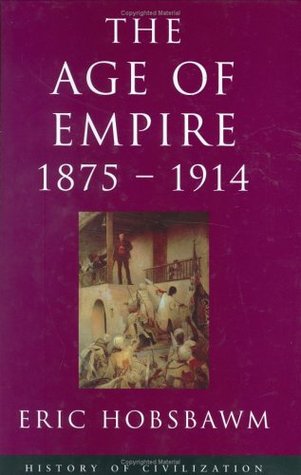

 |

|

The average rating for The Age of Empire, 1875-1914 (History of Civilization) based on 2 reviews is 4.5 stars.
Review # 1 was written on 2018-03-24 00:00:00 Mike Hopkins Mike HopkinsI have read and reviewed The Age of Revolution, dealing with the dual industrial and political revolutions from 1780 up till 1848, the second volume The Age of Capital, essentially covering the rise of Capitalism from 1848 till the 1870's and, from when I started reading Eric Hobsbawm - The Age of Extremes, dealing with the short twentieth century (up till the mid 1990's). The Age of Empire (1875 till the outbreak of the First World War) is the final book in this series of modern history I have read, and, I would suggest, the more academic and most heaviest of all. Everyone who knows history will assume World War One was the result of the assassination of Archduke Franz Ferdinand, however it was more of a result of years of slowly developing European Capitalist Powers searching for new colonies for exploitation and in serious competition with each other (Britain lost the 'Workshop of the World' status from the massive growth of countries such as Germany, France and to a lesser extent Russia - but no less dramatic, in this period), that eventually led to a massive arms build up due to steel and armament mass production- and the eventual grab for territory that every European Power were competing for. The most unfortunate aspect about the whole late 19thC and early 20thC grab for land led to a world-wide conflict (but not on the same scale as World War Two) was the belligerence of the left; Social Democracy and many Socialist organisations treated the outbreak in August 1914 with great 'gung-ho' and patriotism, the 'war to end all wars' was seen along nationalist and patriotic lines. It was only Lenin and the Bolsheviks who argued against what was essentially an Imperialist conflict and were anti-war, whilst Karl Kautsky, the Orthodox Marxist theoretician of the German Social Democratic Party (SPD), ended up supporting the war. The whole period was incredibly transformative in social relations also; from the arts right up to early Womens emancipation (the Suffragettes) and education and the development of philosophy and social science (as well as the natural sciences - Darwinism et al) such as Sociology and Max Weber - its main theoretician, the whole period from 1875-1914 was massively progressive. For the Belle Époque, heralding a dawn of (what Hobsbawm argues) a Bourgeois utopia to end up using the various belligerent competing nations manufacturing output for mass slaughter on an industrial scale (20 million accordingly died), essentially showed the contradictions in Capital. I found this book the heavier of all the other three in the series of the formation of the modern world. You really need to have some, quite serious, understanding of dates, events, persons - you cannot come into this book with having no idea what happened towards the end of the 19thC and the start of the First World War, because even though Hobsbawm is not that dry, he writes critically. None of his works are chronological curriculum history - he was a Marxist Historian and writes expecting you to know your basic history. Good, but it took a bit of wading to get through. |
Review # 2 was written on 2020-05-19 00:00:00 Dennis Pikop Dennis PikopIt is the first book of this series I laid hand on, and to be honest I was expecting it differently. It didn't really present all the major historical events in a timeline, but took for granted the reader’s familiarity with them and proceeded with deep diving in the context. It is though an excellent round description of this era. What were the key players and the power dynamics, their economic status, the rise and fall of empires and how the new world will be redistributed? These will be few of your takeaways from this book. Personally, I particularly enjoyed the last chapter, explaining the reasons of WW1. |
CAN'T FIND WHAT YOU'RE LOOKING FOR? CLICK HERE!!!